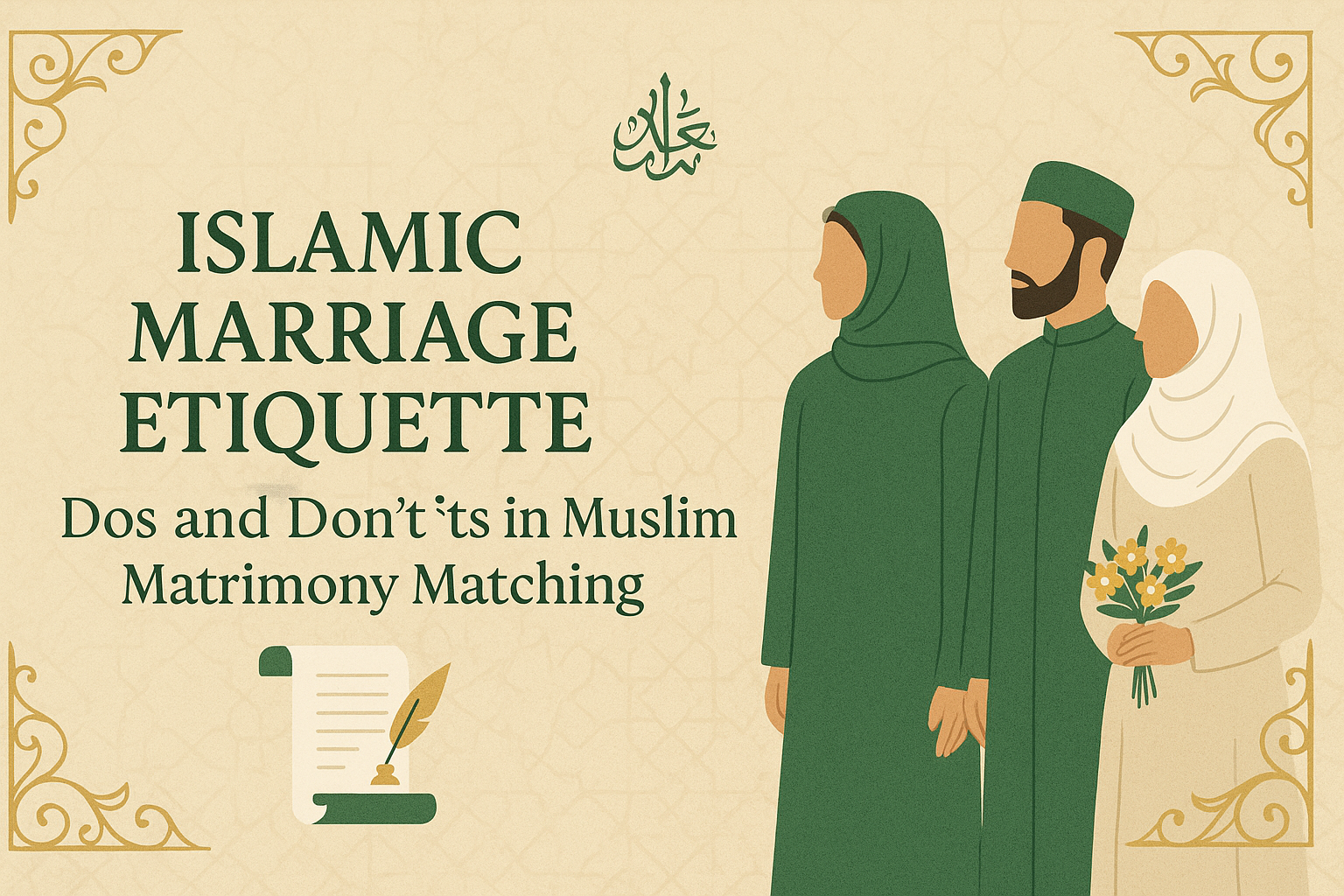
Islamic Marriage Etiquette Dos and Don’ts in Muslim Matrimony Matching
Introduction
Marriage in Islam isn’t just about finding your better half—it’s about doing it the halal way, with sincerity, Sunnah, and a respectful dose of humor. From understanding the nikah contract to knowing when mahr means “more than just a gift,” navigating Muslim matrimony can feel like balancing tradition, emotion, and expectations—all while aunties circle you like matchmaking satellites. Whether you're exploring traditional rishtas or going digital, here are the dos and don’ts to stay spiritually aligned and socially savvy.1. Do Seek Mutual Consent (Yes Means Yes in Halal!)
Consent is the cornerstone. In Islamic marriages,
both the bride and groom must clearly and freely say “Qubool hai” (I accept).
No coercion, no family guilt trips, and certainly no mumbled yeses out of sheer
panic. Mutual willingness is a requirement, not a rom-com twist.
2. Do Clarify the Mahr—Yes, It’s a Serious Deal
Mahr isn’t a wedding gift—it’s a binding obligation.
It’s the right of the bride and must be mutually agreed upon before the nikah.
It can be money, property, or even something symbolic—but it must be valuable
to her and clearly stated. Think of it as the ultimate show of commitment (no,
your vintage sneaker collection doesn’t count).
3. Do Involve the Wali and Witnesses (No Secret Ceremonies, Please)
Islamic marriage involves a structured approach. A wali
(guardian, usually the bride’s father) and two witnesses must be present. It’s
about transparency, protection, and ensuring the union is rooted in
accountability—not in WhatsApp voice notes or Snapchat streaks.
4. Do Prioritize Compatibility (Kafa‘ah Isn’t Just a Buzzword)
Kafa‘ah is the concept of compatibility—spiritually,
socially, intellectually. While opposites attract in movies, real-life marriage
needs alignment in faith, goals, and values. If one dreams of Tahajjud and the
other lives for late-night video gaming marathons, it might be worth
discussing.
5. Don’t Rush—Take Your Time, Not a Leap
Engagement in Islam is not a rushed affair. It's a phase to
assess character, religious observance, and lifestyle goals. Love at first
sight is cute, but lasting companionship grows from informed, intentional
connections.
6. Don’t Cross Boundaries—Modesty Matters
Modesty is the backbone of pre-marital interaction in Islam.
Physical contact, secluded meetings, and excessive flirtation are discouraged
before nikah. Keep communication purposeful, supervised when necessary,
and always respectful. Halal doesn’t mean hiding feelings—it means honoring
boundaries.
7. Do Keep the Wedding Simple and Sunnah-Aligned
The Prophet Muhammad (PBUH) emphasized simple weddings. The
emphasis is on ease, not extravagance. If your wedding budget equals a small
country’s GDP, you might want to dial it back. Make space for joy, not just
Instagram highlights.
8. Do Remember Nafaqah—The Financial Commitment Is Real
After nikah, the husband is financially responsible
for his wife. Nafaqah includes shelter, food, clothing, and emotional
safety. It’s not just about paying bills—it’s about maintaining dignity,
stability, and compassion within the marriage.
9. Do Respect Intimacy Etiquette—Yes, There’s Adab for That Too
Islam encourages intimacy between spouses—but with respect
and spiritual awareness. There's even a prayer before intimacy. It's not about
awkwardness; it's about grounding even the most private moments in divine
intention.
10. Do Understand Rights & Roles—Mutual Respect Is Sunnah
Marriage in Islam is a partnership based on love, mercy, and
mutual obligations. It’s not a power struggle. Understanding each other's
rights, roles, and responsibilities paves the way for peace—not
passive-aggressive dishwashing standoffs.
11. Don’t Skip the Walimah—Celebrate, But With Purpose
The walimah is the celebratory feast post-nikah.
It’s a Sunnah act meant to announce the marriage and bring people together in
joy. It doesn’t have to be lavish—it just needs to be sincere, inclusive, and
full of good food (and fewer selfies).
12. Do Make It Legally Official Too
While the nikah fulfills the religious requirement,
registering your marriage under civil law adds legal protection and clarity.
It’s a wise step that complements your spiritual bond with civic
responsibility.
Conclusion
Islamic marriage etiquette is more than a checklist—it’s a
guide to build a foundation of faith, respect, and lifelong love. Done right,
it blends Islamic principles with practical steps—creating a bond that’s as
spiritually fulfilling as it is emotionally rewarding. So if you’re venturing
into the rishta scene, take it slow, keep it halal, and remember: what
starts with Qubool hai should always continue with rahmah (mercy)
and muhabbah (love).